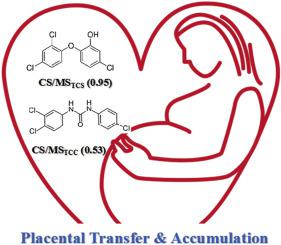Environmental Pollution ( IF 8.9 ) Pub Date : 2020-07-02 , DOI: 10.1016/j.envpol.2020.115117 Xueyuan Bai 1 , Bo Zhang 1 , Yuan He 1 , Danhong Hong 2 , Shiming Song 1 , Yingyan Huang 1 , Tao Zhang 1

|
Triclosan (TCS) and Triclocarbon (TCC) are chlorinated synthetic antimicrobial agents formaternal urinelated in quantities of consumer products. However, the biomonitoring of direct exposure reflection for fetuses are rare. In this study, we determine the concentrations of TCS and TCC in paired maternal serum, cord serum, maternal urine, and amniotic fluid samples collected from a cohort of 95 expecting mother-fetal pairs in Southern China. TCS and TCC are detected widely (detection rates: >76.9%) in maternal serum, cord serum, maternal urine, and amniotic fluid samples. TCS is found to be the predominant antimicrobial agent with median concentrations in maternal serum (1.5 ng/mL) and cord serum (1.8 ng/mL) that are one order of magnitude higher than those of tcc in maternal serum (0.085 ng/mL) and cord serum (0.052 ng/mL), respectively. Cord serum concentrations of tcs and tcc correlated well with the concentrations in maternal serum, which reflect the mothers’ contribution to fetal exposure. The higher median ratio of cord serum/maternal serumTCS (0.95) compared to that of cord serum/maternal serumTCC (0.53) indicates high placental transmission ability of TCS. Moreover, the facility to penetrate the placental barrier and hard to depurate characteristics lead to the long residence of TCS in the fetal environment, causing great concern over the prenatal exposure risks during the critical window of fetal development. This study provides a novel contribution by increasing existing knowledge on the exposure assessment of TCS and TCC during pregnancy through the exploration of matched maternal-fetal samples.
中文翻译:

母胎血清,尿液和羊水样本中的三氯生和三氯生碳及其对产前暴露的影响。
三氯生(TCS)和三氯生(TCC)是用于大量消费品中母体尿液的氯化合成抗菌剂。但是,对胎儿进行直接暴露反射的生物监测很少。在这项研究中,我们确定了来自华南地区95对预期母胎对的母亲血清,脐带血清,母亲尿液和羊水中成对样本中TCS和TCC的浓度。在母体血清,脐带血清,母体尿液和羊水样本中广泛检测到TCS和TCC(检出率:> 76.9%)。已发现TCS是主要的抗菌剂,其母体血清(1.5 ng / mL)和脐带血清(1.8 ng / mL)的中值浓度比母体血清(0.085 ng / mL)的tcc浓度高一个数量级。和脐带血清(0.052 ng / mL)。脐带血中tcs和tcc的浓度与母亲血清中的浓度有很好的相关性,这反映了母亲对胎儿暴露的贡献。脐带血清/母体血清的中位数比例较高与脐带血清/母体血清TCC(0.53 )相比,TCS(0.95)表明TCS的胎盘传播能力高。此外,穿透胎盘屏障和难以净化的特征的设施导致TCS在胎儿环境中的长期居住,引起了在胎儿发育的关键窗口期间对产前暴露风险的高度关注。这项研究通过探索相匹配的母胎样本,增加了对妊娠期TCS和TCC暴露评估的现有知识,从而做出了新的贡献。



























 京公网安备 11010802027423号
京公网安备 11010802027423号